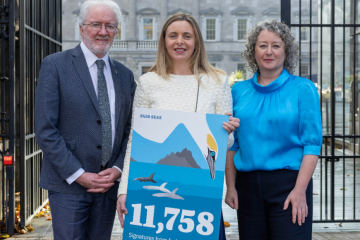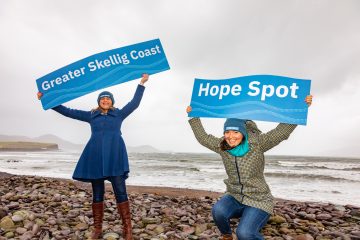Migrant workers on fishing boats still face “gross forms of exploitation”, Jobs Committee told

July 25, 2017
A permit scheme introduced in February 2016 to regularise the employment of migrant workers on Irish fishing boats has been severely criticised at a recent committee hearing.
Rolled out by the Department of Jobs, Enterprise and Innovation in 2015, the Atypical Worker Permission Scheme gave undocumented fishermen from outside the EU from February to July 2016 to come forward and apply for a work permit.
The scheme required both an employer and an employment contract, with around 200 permissions issued by the Irish Naturalisation and Immigration Service (INIS) up to the end of June 2017.
The scheme was brought it following an investigation in The Guardian in November 2015 alleged that many migrant workers on Irish fishing vessels had been trafficked onto vessels for labour exploitation.
The investigation also alleged that workers were being paid below minimum wage or was not paid wages, were subjected to extreme sleep deprivation and dangerous working practices and had been denied freedom of movement.
The article also suggested that individuals had been routed legally through the UK to Northern Ireland and transported illegally into the Republic of Ireland without any Irish permission or Visa.
In response, the Government established a task force to examine the issues raised and to also make recommendations to minimise future risk of exploitation. Its primary recommendation was for the establishment of the Atypical Worker Permission Scheme.
However, Labour Senator Ged Nash, as well as the International Transport Workers’ Federation (ITF) and the Migrant Rights Center of Ireland, heavily criticised the scheme at a hearing of the Joint Committee on Jobs, Enterprise and Innovation earlier this month.
Mr Nash, who set up the original task force while Minister of State for Business and Employment, said that in some cases the system “exploited and abused workers” who had intended to work in good faith on-board Irish fishing vessels. He added that very little has been done to enforce compliance, and criticised several enforcement agencies for failing to protect workers.
Also speaking at the hearing, Edel McGinley, Director of the MRCI, said that “gross forms of exploitation” have routinely found on Irish fishing boats, as well as “a lack of monitoring and enforcement”. A recent survey conducted by the MRCI indicated that around one-third of migrant workers reported routine verbal and physical abuse.
Nearly half of migrant workers interviewed for the survey also reported injuries such as serious cuts and crushed limbs, in addition to feeling unsafe as a result of exhaustion from long working-hours and sleep deprivation.
Ken Fleming from the ITF said that in spite of campaigning for improvements in the Irish fishing industry since 2008, “we have achieved nothing”. Not only had the permits failed in their intended effect but they had instead “legalised slavery”, he added.
The ITF union alledges to have found numerous incidences of illegality on Irish fishing boats including non-payment of wages, migrant worker trafficking and poor uptake of permits. Mr Fleming added that there has been systematic mistreatment of Pilipino, Ghanaian, Indonesian and Egyptian migrants.
A new Workplace Relations Commissions (WRC) report in relation to the scheme released last week highlights the detection of over 200 violations across 150 vessels since February 2016.
The violations relate to failure to produce or to keep records (36 per cent), leave, public holiday and Sunday entitlements (20 per cent), working without permission (14 per cent) and a failure to issue payslips (13 per cent).
Ms. Oonagh Buckley, Director General of the WRC said: “Many vessel owners engage with Inspectors and respond satisfactorily, but if they don’t, the WRC will move to deal with contraventions through compliance and fixed payment notices or prosecutions.” The WRC intends to inspect the remaining 26 vessels by the end of this summer.
[x_author title=”About the Author”]







